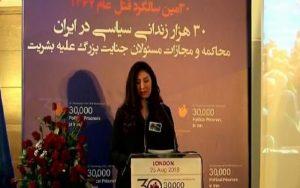The relatives of the political prisoners massacred in 1988, in Iran, share their experiences
The 30th anniversary of the massacre of 30,000 political prisoners in Iran by Khomeini’s fatwa, was held calling for justice for the victims of the 1988 massacre. This is the most important political demands of the Iranian people from the mullahs’ regime. Ending the international silence on the massacre and holding accountable the perpetrators and masterminds of the crime is the least demand by the families of the victims.
The martyr’s relatives share their experie nces with the attendees at the conference.

Pointing to the most recent plot of the Mullahs regime against the Iranian resistance members located in Albania, Ms. Rajabi warned the British Channel 4 about not to allow the Iranian regime to take advantage of them against the Iranian people.
She added, “Two of my aunts were executed in the 1988 massacre. My aunt, Mehrangiz, 23, and another aunt was only 17 who received 10 years’ prison sentence, but they did not let her finish her sentence and was executed in 1988 massacre.”
Then Omid Ebrahimi the spokesman of the Youth Association in the UK took the floor, “On behalf of the Youth Association in the UK, I would like to commemorate those executed in the 1988 massacre who stood up to the regime. Khomeini thought he could exterminate the PMOI by this genocide.”
He emphasized, “We actively support the youngsters in Iran and we are devoted to supporting their resistance units. We support Maryam Rajavi’s Ten-Point Plan and believe the NCRI is the only viable democratic alternative to the clerical regime.”
Ms. Heshmatikhah pointed to the political prisoners’ massacre and stated, “30 years ago, in 1988, 30,000 young Iranians many of whom were younger than me, were executed in mass executions. Families do not of their places of burial. There has been no independent investigation into this crime against humanity,” she continued, “The efforts of the Iranian Resistance under Maryam Rajavi’s leadership encouraged international organizations such as Amnesty International to follow up on this issue”.
“We urge the international organizations to condemn the 1988 massacre,” she demanded.